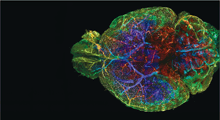Mouse models do not fully capture the degeneration of brain networks seen in human Alzheimer’s disease (AD). Thus, extensive validation of therapeutic targets in many animal models must precede human clinical research. Huang et al. now show that the absence of G protein–coupled receptor 3 (GPR3), a protein expressed in the brain, alleviated cognitive deficits and reduced amyloid pathology in four disease-relevant mouse models of AD. Furthermore, postmortem brain tissue from a subset of AD patients revealed elevated GPR3. Thus, GPR3 may represent a therapeutic target in AD.







